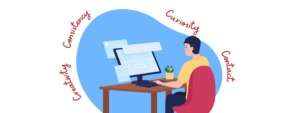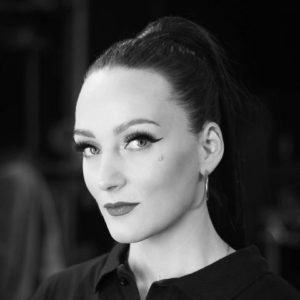The Work Hunt
Cheers erupt from the crowd, hats are thrown high in the air, and all the graduates walk out with the same thing on their minds: the hunt! Regardless of their profession, everyone wants in. Lawyers, painters, teachers, and jugglers must figure out what they can bring, what sets them apart, and will appeal to employers. People read, write, listen, learn, study, and struggle to become as skilled as they can be. Playground, school, and work: that’s how the life song goes. Or is it? Isn’t a lyric missing in there? “Playground, school, FINDING work.”
No matter how talented the individual is, job hunting is unavoidable. Since a majority of circus artists are freelancers, the hunt remains on most minds between a flip and a flash. There are long-term contracts, some go on performing the same act in the same show for years. However, spending equal amounts of time selling performances as preparing and offering them is a freelancer’s reality.
Securing employment is time-consuming, and booking enough shows to feel financially and emotionally stable can be overwhelming. Artistic administration hours are unpaid and necessary. To earn a living, artists regularly send emails, apply for work visas, fix costumes, and update their technical riders. Scrolling through websites, databases, and social media platforms provides artists an overview of the industry’s status and hints at where their talents and persona might fit in. To avoid being bombarded with too much or not enough information and preserve their mental health, circus artists shall have a schedule and time limits. No one is meant to spend 20 hours a day staring at a screen!
According to Australian director Zebastian Hunter, there are two real ways to find work: by being seen and talked about. One can be the most flexible individual in our world’s history, but even the best tricks and most moving moments need the right marketing. Marketing, and a little bit of luck!
“The likelihood of employment is based on being in the right place at the right time. It’s about being seen or heard of when it’s relevant to what you do. It is also based on someone else’s opinion, on their needs and understanding of what you do. Some are circus experts, others have no experience to inform their decision and just go with their instinct,” explains Hunter.
Visibility gets the word going and helps one build their network and reputation. Performing in circus festivals, shows, auditions, and sending promotional videos are a handful of ways to catch an employer’s attention. Any person who has taught, seen, performed, or worked with an artist can help them get their next contract with a few good words. Therefore, being an invested, reliable, and pleasant person to work with is crucial. Nobody wants drama or a toxic work environment and a hard-to-work-with reputation can tarnish the most brilliant performer.

“Build relationships with your peers, trainers, casting consultants, and directors. They are the ones that will be your biggest advocates in finding work. You never know when someone might be able to recommend you for a role that suits you,” concludes the director.
Promotion is an integral part of the work hunt. Movie studios invest massively in promotional campaigns to ensure great box office numbers. Teasers, trailers, TV appearances, online content— these are all good tactics to catch people’s attention. No circus artist has MGM’s or Universal’s budget, but having good promotional material is essential.
An image might be worth a thousand words, but words often come first and cannot be overlooked. Typos or sounding too casual in a first email can be a professional turn-off. There are free tools and software available to polish one’s words. A friend or parent revising a resume can do a lot cost-free. Since attend live auditions on a daily basis is humanly impossible, this resume and a headshot are an artist’s first impression on employers. Attention must be paid to every piece they send out: personal introduction, resume, pictures, demos. These all reflect on who the artist is and what they have to offer. If one feels unskilled to produce their own material, there are other talented and helpful people out there. Promotion-related expenses are an as important investment as the one made in training and act creation.
Luckily, the best promotional tool is free of charge: staying in contact! There are dozens upon dozens of new artists entering the industry each year and no producer can keep track of every single encounter. Reaching out to former employers and previously contacted directors shows interest in their work while reminding them of a talented individual. Inquiring about their current projects and how their latest show worked out while sharing personal news is a form of promotion. Foot juggler and business coach Ulrike Storch goes a step further and suggests having a professional email newsletter. Her clients and contacts get notified of a tour that might stop in their town, an upcoming TV appearance, the creation of a new act, or any other professional accomplishment of hers.

“The sooner you get that email list, the better! It isn’t some random spreadsheet, but rather, a strong circle of friends that you want to serve and stay in touch with. Create interesting content with clear images and the right words to present yourself in the best light,” explains Storch.
Fresh out of school or already onstage, her advice remains the same: Be as unique as possible! As fun as changing tricks, styles, and songs every other month can sound, no artist can fit in every show nor perform on every stage. Therefore, circus artists should identify what suits them best, singles them out, and can draw the most interest to them. “It might feel like it has nothing to do with who you are when, in fact, it really does! If performed in a truly personal way, these ‘tired old tricks’ look fresh and weave the piece with an artist’s uniqueness,” adds the businesswoman.
Some were born with the entrepreneurial gene and instinctively know how to get booked. For those who weren’t bitten by the business bug, there are agents for whom getting contracts signed is a full-time job. Acknowledging a lack of talent or interest for the business side of this lifestyle can save an artist time, energy, and frustration. No one is expected to excel at training, directing, costume designing, performing, selling themselves, and filing taxes.
Everyone needs a helping hand in one area or another, and getting representation might be the strategic move one needs to get ahead. Agents book artists for a living and the latter must therefore accept forfeiting a percentage of their salary. Given that some venues and productions book all their artists through agents alone, a salary cut is no big sacrifice in comparison to the weeks or months of work that follow. If hours of scrolling and emailing are tainting the circus life, it is worth finding out who books where and asking around what the normal commission is for various contracts. Every artist must take the steps to do business in a way that feels right to them.

“It’s called show business for a reason: you’ll get the shows if you do the business! It is dreaded by many, but put the time in,” says Brigitte Scherrer. The Cirque du Soleil casting scout handles artists and their materials on a daily basis. She recommends a simple, impactful, and special effect-free demo to get noticed. It should be neither too long nor too short and showcase the artist in different styles, especially if they aren’t applying for one specific role. It will be easier for the artistic team to picture this individual in a project that’s still in its creation phase. Pointing out the significant amount of artists entering the casting database each year, Scherrer recommends an annual material update to stay relevant and be remembered. Once again, it’s all about staying in contact!
Work hunting does not mean starting from scratch every day, but rather finding the balance between the old and the new. One should get the benefits of successful past collaborations on one hand and calluses from seeking new ones on the other.
This hunt revolves around the four Cs: Consistency, Creativity, Curiosity, and Contact.

It isn’t about starting from scratch, but investing time in it every day.
One must be as creative off stage as they are on it— such creativities are not mutually exclusive and tend to feed one another.
To get a foot through many doors, one must remain curious about what’s happening behind them. Seeing shows, researching which companies are producing new work, asking seasoned professionals where they’re off to next, scrolling through festivals’ programs…
Lastly: Writing, calling, reaching out, and doing everything to create and nurture connections.
Get your hunting gear and start looking for your next gig!
.
Main Image: Courtesy of the author, featuring Martin Frenette and contortionist, Lisbeth Mikoleit.
Special thanks to:
...
Do you have a story to share? Submit your news story, article or press release.










